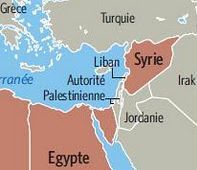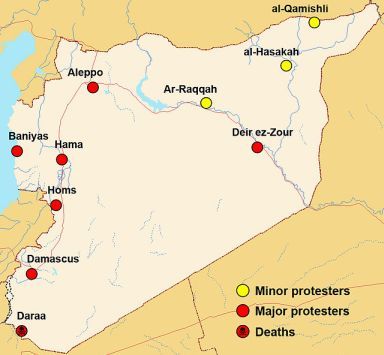 Everything you need to know about today’s media coverage of Israel and the Mideast.
Everything you need to know about today’s media coverage of Israel and the Mideast.
Hamas confirms that Israel doesn’t occupy Gaza, Assad’s desperately appeasing Hamas, and a Belgian newspaper apologizes for a Mideast map that omitted Israel.
Visit Backspin everyday — and never miss another cheat sheet.
Israel and the Palestinians
• Lead Screed: Boston Globe columnist HDS Greenway argues that Israel is practising colonialism:
By 1967, just at the time Israel was gaining control over its captive peoples, the institution was dying. Once empires were praised as the bringers of civilization to backward peoples, the “white man’s burden’’ and all that. But by the mid-’60s, empires were no longer acceptable.
• Hamas confirms what we knew all along: Israel doesn’t occupy Gaza. Money quote at YNet News:
“Popular resistance is inappropriate for the Gaza Strip,” al-Zahar said. “Against whom exactly would be rally? Such resistance would be fitting if Gaza was occupied.” However, he claimed that all forms of resistance – including the armed kind – are appropriate for the West Bank, as it is “still under occupation.”
See also Maan News.
• The Belgian newspaper, Le Soir, apologized for publishing a Mideast map that didn’t include Israel, though the PA was mentioned. The European Jewish News says that criticism from Belgium’s Jewish leaders went one step too far:
Reacting to the accusation, the paper’s chief editor Didier Hamman admitted that “this is undoubtedly a mistake, I plead guilty and apologize.” But he also said he was “shocked and insulted” by the accusation from CCOJB that the newspaper did it intentionally.

Arab Spring Winter
• YNet News picks up on Arab reports that Bashar Assad wants to meet the leaders of Hamas and other Damascus-based terror groups who are in the process of relocating to more politically correct bases of operation:
According to the newspaper, which is affiliated with Hezbollah, the meeting aims to broker reconciliation between Assad and Hamas Politburo Chief Khaled Mashaal, but the two are not likely to meet in private at this time.
• In a Washington Times interview, Syrian opposition leader Samir Nashar said most Syrias want foreign intervention, but are too afraid to publicly say so, adding:
. . . a Turkish-led NATO operation with “cover” from Arab states would enjoy the greatest support among Syrians.
The interview online didn’t address the opposition’s views on Israel or Iran, but according to Haaretz, Nashar also said a new regime would support the Palestinians, seek to reclaim the Golan Heights, and change the nation’s relationship with Iran.
• This Globe & Mail staff-ed picks apart the woeful shortcomings of the Arab League observer team in Syria, concluding:
Until now, the Arab League has merely lent legitimacy to an illegitimate process and helped prolong the abuses that the Syrian government continues to orchestrate unchecked. If it wishes to salvage what remains of its reputation, the Arab League should replace Lt.-Gen. al-Dabi, assign more observers and stop Mr. al-Assad from manipulating its mission.
The Australian also takes a dim view of the monitors.

• Syrian gas pipeline blown up nears Homs. CNN says gov’t and rebel officials blame each other.
Rest O’ the Roundup
• Nice Times of London profile of the Israeli Philharmonic Orchestra, which is celebrating its 75th anniversary. Conductor Zubin Mehta comments on last year’s ugly incident at The Proms.
There are more diplomatic words from Mehta himself. Why did he think the orchestra been singled out like this after years of international touring? “Look at Israel in the world today,” he says simply. “One doesn’t like to admit it, but it is a country in isolation — much more so than before. And their closest friends — the UK and the US — are thinking twice.”
This is tricky ground for the IPO, whose long-held credo is that they are the country’s foremost “cultural ambassador”. As its celebrations testify, the IPO predates the state of Israel by some 12 years. Since Arturo Toscanini conducted the first concert of the “Palestine Orchestra” on December 26, 1936, it has been hailed as a shining example of how a young nation could produce a world-class ensemble of European classical music.

• What kind of impact will the EU’s financial headaches have on the Israeli economy in 2012? The Media Line examines the issue.
• Don’t think the Arab world is ignorant of Israel’s religious/secular tensions. An Asharq al-Awsat commentary’s observations are no different than what I’ve seen in Western papers.
(Image of Mehta via Flickr/Apoorva Guptay; Syrian map via Wikimedia Commons/Tonemgub2010)

